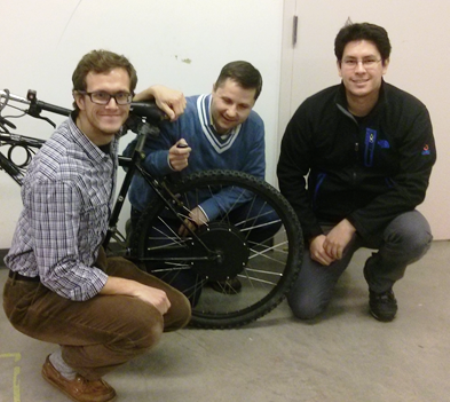
Mechanical engineering graduate students Michael Leitch, Nicholas Olmedo and Tamran Lengyel are developing devices to help kids with disabilities cycle safely.
Edmonton-Mechanical engineering graduate student Michael Leitch is a passionate year-round cyclist who won't even let a bout of -30 C weather get in the way of spinning the wheels of his trusty ride.
But he knows from experience that being able to ride at all is a privilege he cannot take for granted. Especially now that he and two fellow graduate students are working on a project to help disabled riders with two fundamental skills of biking-braking and accelerating safely.
Leitch, along with Nicholas Olmedo and Tamran Lengyel-also keen cyclists-wanted to do something that involved bicycles and would help others. They met with representatives from You Can Ride Two, a partnership between pediatric physiotherapists and occupational therapists and the Edmonton Bicycle Commuters' Society (EBC), and decided to tackle the issue of braking and accelerating.
"A common challenge for many of their kids is braking," said Leitch. "In some cases the child doesn't have the strength or mobility in their fingers to pull a traditional brake lever. In other cases, they're strong enough to propel themselves on the bike at great speeds but don't have the cognitive capacity to stop in an emergency."
Leitch says the motivation to get involved with the community group came because he and his partners wanted to be involved in solving a "real world" problem using their combined passion for engineering, cycling and design. He says that while they enjoyed their day jobs in the oil and gas industry and academia, they felt something was missing.
"We really wanted to connect with something that we knew would really make a difference in peoples' lives," Leitch said.
"Janine was super supportive of us pursuing this," Leitch said referring to Janine Halayko, a physiotherapy volunteer from You Can Ride Two.
Halayko says mechanical engineering students have been involved in a number of projects over the last few years that have helped find solutions for challenges faced by children with physical and mental disabilities learning to ride a bike. These projects include another remote-control braking system design and folding balance wheels.
Leitch says that up until now, the products being considered to help with braking and acceleration require extensive customization of the child's bike, which poses a challenge not only for mechanics, but for families whose children have these special needs and are still growing.
"We have an idea for a device that will not only provide braking (by push button on the handlebars or by a remote key fob in the hands of a parent or therapist) but limited power assist, another feature that the folks at You Can Ride Two mentioned would be very helpful for many of their kids," he said.
"This system will mean more independence for the child and more peace of mind for their parents," Halayko said.
The device will be easily transferred between bikes using common tools. The trio is currently developing a prototype, but the goal is to outfit 20 of You Can Ride Two's bicycles with the device.
The three are hopeful of having their prototype ready for the organization's swap meet on March 6, 2015.